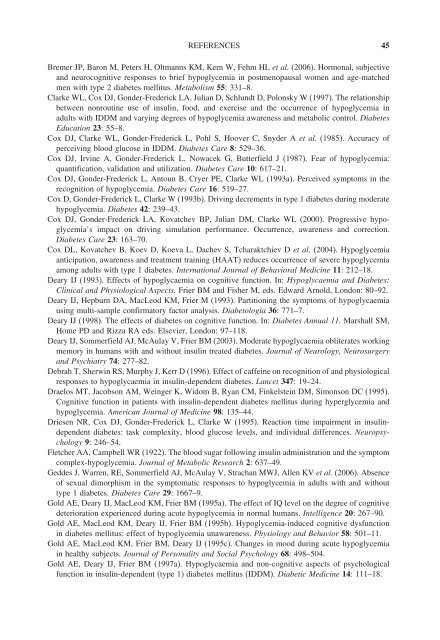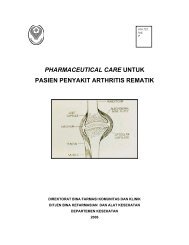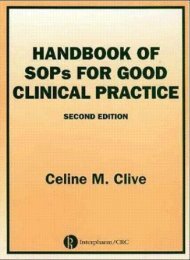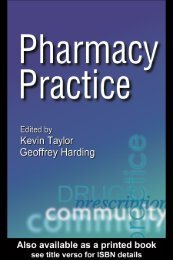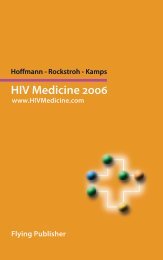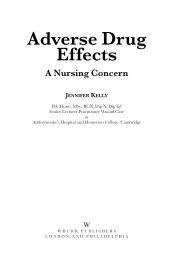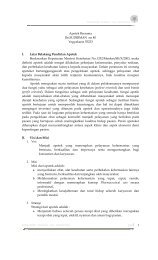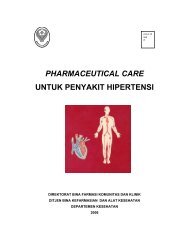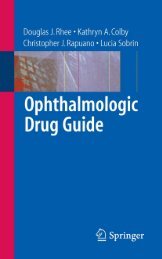Hypoglycaemia in Clinical Diabetes
Hypoglycaemia in Clinical Diabetes
Hypoglycaemia in Clinical Diabetes
- No tags were found...
Create successful ePaper yourself
Turn your PDF publications into a flip-book with our unique Google optimized e-Paper software.
REFERENCES 45Bremer JP, Baron M, Peters H, Oltmanns KM, Kern W, Fehm HL et al. (2006). Hormonal, subjectiveand neurocognitive responses to brief hypoglycemia <strong>in</strong> postmenopausal women and age-matchedmen with type 2 diabetes mellitus. Metabolism 55: 331–8.Clarke WL, Cox DJ, Gonder-Frederick LA, Julian D, Schlundt D, Polonsky W (1997). The relationshipbetween nonrout<strong>in</strong>e use of <strong>in</strong>sul<strong>in</strong>, food, and exercise and the occurrence of hypoglycemia <strong>in</strong>adults with IDDM and vary<strong>in</strong>g degrees of hypoglycemia awareness and metabolic control. <strong>Diabetes</strong>Education 23: 55–8.Cox DJ, Clarke WL, Gonder-Frederick L, Pohl S, Hoover C, Snyder A et al. (1985). Accuracy ofperceiv<strong>in</strong>g blood glucose <strong>in</strong> IDDM. <strong>Diabetes</strong> Care 8: 529–36.Cox DJ, Irv<strong>in</strong>e A, Gonder-Frederick L, Nowacek G, Butterfield J (1987). Fear of hypoglycemia:quantification, validation and utilization. <strong>Diabetes</strong> Care 10: 617–21.Cox DJ, Gonder-Frederick L, Antoun B, Cryer PE, Clarke WL (1993a). Perceived symptoms <strong>in</strong> therecognition of hypoglycemia. <strong>Diabetes</strong> Care 16: 519–27.Cox D, Gonder-Frederick L, Clarke W (1993b). Driv<strong>in</strong>g decrements <strong>in</strong> type 1 diabetes dur<strong>in</strong>g moderatehypoglycemia. <strong>Diabetes</strong> 42: 239–43.Cox DJ, Gonder-Frederick LA, Kovatchev BP, Julian DM, Clarke WL (2000). Progressive hypoglycemia’simpact on driv<strong>in</strong>g simulation performance. Occurrence, awareness and correction.<strong>Diabetes</strong> Care 23: 163–70.Cox DL, Kovatchev B, Koev D, Koeva L, Dachev S, Tcharaktchiev D et al. (2004). Hypoglycemiaanticipation, awareness and treatment tra<strong>in</strong><strong>in</strong>g (HAAT) reduces occurrence of severe hypoglycemiaamong adults with type 1 diabetes. International Journal of Behavioral Medic<strong>in</strong>e 11: 212–18.Deary IJ (1993). Effects of hypoglycaemia on cognitive function. In: <strong>Hypoglycaemia</strong> and <strong>Diabetes</strong>:Cl<strong>in</strong>ical and Physiological Aspects. Frier BM and Fisher M, eds. Edward Arnold, London: 80–92.Deary IJ, Hepburn DA, MacLeod KM, Frier M (1993). Partition<strong>in</strong>g the symptoms of hypoglycaemiaus<strong>in</strong>g multi-sample confirmatory factor analysis. Diabetologia 36: 771–7.Deary IJ (1998). The effects of diabetes on cognitive function. In: <strong>Diabetes</strong> Annual 11. Marshall SM,Home PD and Rizza RA eds. Elsevier, London: 97–118.Deary IJ, Sommerfield AJ, McAulay V, Frier BM (2003). Moderate hypoglycaemia obliterates work<strong>in</strong>gmemory <strong>in</strong> humans with and without <strong>in</strong>sul<strong>in</strong> treated diabetes. Journal of Neurology, Neurosurgeryand Psychiatry 74: 277–82.Debrah T, Sherw<strong>in</strong> RS, Murphy J, Kerr D (1996). Effect of caffe<strong>in</strong>e on recognition of and physiologicalresponses to hypoglycaemia <strong>in</strong> <strong>in</strong>sul<strong>in</strong>-dependent diabetes. Lancet 347: 19–24.Draelos MT, Jacobson AM, We<strong>in</strong>ger K, Widom B, Ryan CM, F<strong>in</strong>kelste<strong>in</strong> DM, Simonson DC (1995).Cognitive function <strong>in</strong> patients with <strong>in</strong>sul<strong>in</strong>-dependent diabetes mellitus dur<strong>in</strong>g hyperglycemia andhypoglycemia. American Journal of Medic<strong>in</strong>e 98: 135–44.Driesen NR, Cox DJ, Gonder-Frederick L, Clarke W (1995). Reaction time impairment <strong>in</strong> <strong>in</strong>sul<strong>in</strong>dependentdiabetes: task complexity, blood glucose levels, and <strong>in</strong>dividual differences. Neuropsychology9: 246–54.Fletcher AA, Campbell WR (1922). The blood sugar follow<strong>in</strong>g <strong>in</strong>sul<strong>in</strong> adm<strong>in</strong>istration and the symptomcomplex-hypoglycemia. Journal of Metabolic Research 2: 637–49.Geddes J, Warren, RE, Sommerfield AJ, McAulay V, Strachan MWJ, Allen KV et al. (2006). Absenceof sexual dimorphism <strong>in</strong> the symptomatic responses to hypoglycemia <strong>in</strong> adults with and withouttype 1 diabetes. <strong>Diabetes</strong> Care 29: 1667–9.Gold AE, Deary IJ, MacLeod KM, Frier BM (1995a). The effect of IQ level on the degree of cognitivedeterioration experienced dur<strong>in</strong>g acute hypoglycemia <strong>in</strong> normal humans. Intelligence 20: 267–90.Gold AE, MacLeod KM, Deary IJ, Frier BM (1995b). Hypoglycemia-<strong>in</strong>duced cognitive dysfunction<strong>in</strong> diabetes mellitus: effect of hypoglycemia unawareness. Physiology and Behavior 58: 501–11.Gold AE, MacLeod KM, Frier BM, Deary IJ (1995c). Changes <strong>in</strong> mood dur<strong>in</strong>g acute hypoglycemia<strong>in</strong> healthy subjects. Journal of Personality and Social Psychology 68: 498–504.Gold AE, Deary IJ, Frier BM (1997a). <strong>Hypoglycaemia</strong> and non-cognitive aspects of psychologicalfunction <strong>in</strong> <strong>in</strong>sul<strong>in</strong>-dependent (type 1) diabetes mellitus (IDDM). Diabetic Medic<strong>in</strong>e 14: 111–18.


